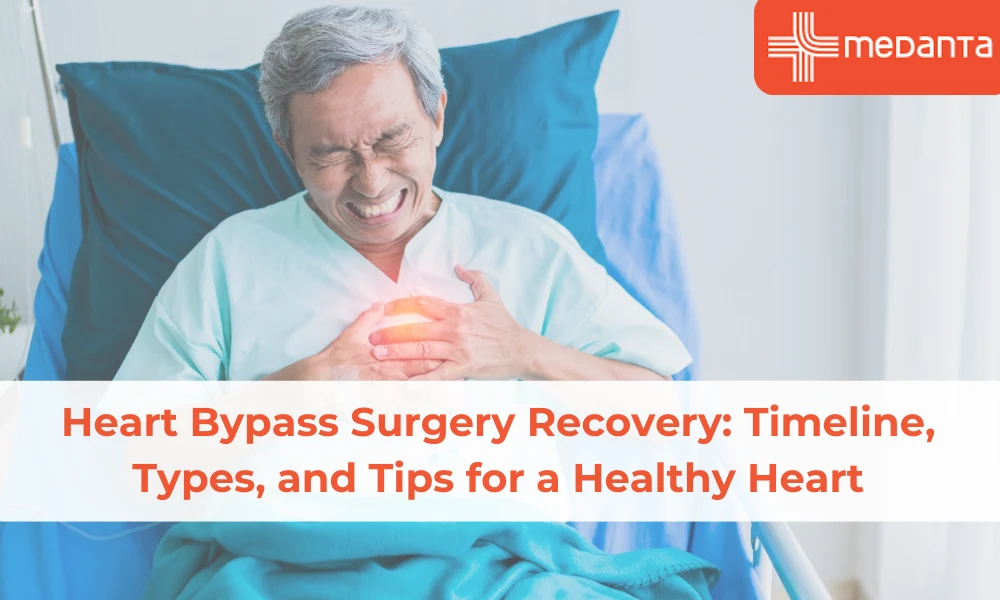Heart Bypass Surgery Recovery: Timeline, Types, and Tips for a Healthy Heart

TABLE OF CONTENTS
The coronary artery bypass graft (CABG) surgery is one of the most performed surgeries, with a number reaching two million each year worldwide. Recovery time after bypass surgery is a vital factor that patients need to consider before this life-changing procedure. After surgery, the healing process usually takes 6 to 12 weeks, though each patient's experience differs.
Patients typically stay in the hospital for 5-7 days after open heart surgery. A well-laid-out rehabilitation period follows this initial stay. Most patients see their symptoms improve substantially and regain their strength within three months after surgery. The surgery's benefits can extend up to 15 years with the right combination of medication, diet, exercise, and stress management. Patients who receive this procedure often live many more healthy years of life, which shows how well it works when combined with proper aftercare.
This article outlines what patients should expect during their bypass surgery recovery. The information covers everything from immediate post-operative care to long-term healing milestones. A clear understanding of this timeline will give patients realistic expectations and the best possible outcome on their path to heart health.
What is Coronary Bypass Surgery?
Coronary artery bypass grafting (CABG), which most people know as bypass surgery, creates a new path that allows blood to flow around blocked coronary arteries. This life-saving procedure uses blood vessels from other parts of your body—usually leg veins or chest arteries—to build new pathways. These pathways help oxygen-rich blood reach your heart. The surgery restores proper blood flow that the arteries can't provide due to plaque buildup.
Who Needs Bypass Surgery and Why?
Patients need bypass surgery when their heart's coronary arteries become severely narrowed or blocked. Doctors recommend this procedure for patients who have more than 50% blockage in their left main coronary artery, three-vessel disease, proximal left anterior descending blockage, or chest pain that medications can't control. The surgery helps relieve symptoms, prevents heart attacks, and can extend life for people with severe coronary artery disease.
Types of Bypass Procedures
Surgeons use two main types of bypass procedures:
On-pump surgery: The original approach requires the surgeon to open the chest, stop the heart, and use a heart-lung machine that maintains circulation.
Off-pump surgery: A newer technique lets the surgeon operate on the beating heart without stopping it. This method might reduce the risks of bleeding and stroke.
Surgeons also perform keyhole bypass surgery through small incisions and use robotic-assisted procedures.
Recovery after Bypass Surgery: What's Normal?
Hospital stays usually last about a week. Patients spend the first couple of days in intensive care before moving to a regular ward. The body needs time to heal. You might feel chest pain near your incisions, lose your appetite, experience mood changes and feel tired for several weeks. Most people need 6 to 12 weeks to heal completely. Light activities become possible within 2-3 weeks, but full recovery depends on your health.
Red Flags After Surgery That Need Urgent Care
You should get medical help right away if you notice:
Chest pain or tightness that doesn't improve with rest
Breathing problems or shortness of breath
Fever above 38°C
Surgical sites that become unusually red, warm or start discharging
Heart palpitations or irregular heartbeats
Sudden dizziness, severe headaches, or speech difficulties
Conclusion
Bypass surgery is a chance for patients with severe heart blockages to transform their lives. This vital procedure creates new pathways for blood flow that help your heart work better and ease painful symptoms.
Recovery takes patience. You might feel tired or notice mood changes in the first few weeks after leaving the hospital. Most people slowly get their strength back and can start light activities within 2-3 weeks.
Your healing depends on several factors. Your age, overall health, and how well you follow doctor's advice make a big difference. The best part? With proper care, the surgery's benefits can last up to 15 years and give you a shot at a healthier, more active life.
Pay attention to warning signs during recovery. You should get medical help right away if you have chest pain that lingers, trouble breathing, or unusual discharge from surgical areas.
Recovery takes time - usually 6 to 12 weeks for complete healing. The outlook stays positive for most patients. People who have successful bypass surgery live an average of 18 years longer, which shows how effective this treatment can be.
Staying in touch with your healthcare team throughout recovery helps you get the best results. Your heart deserves this second shot at better health.
Bypass surgery is a chance for patients with severe heart blockages to transform their lives. This vital procedure creates new pathways for blood flow that help your heart work better and ease painful symptoms.
Recovery takes patience. You might feel tired or notice mood changes in the first few weeks after leaving the hospital. Most people slowly get their strength back and can start light activities within 2-3 weeks.
Your healing depends on several factors. Your age, overall health, and how well you follow doctor's advice make a big difference. The best part? With proper care, the surgery's benefits can last up to 15 years and give you a shot at a healthier, more active life.
Pay attention to warning signs during recovery. You should get medical help right away if you have chest pain that lingers, trouble breathing, or unusual discharge from surgical areas.
Recovery takes time - usually 6 to 12 weeks for complete healing. The outlook stays positive for most patients. People who have successful bypass surgery live an average of 18 years longer, which shows how effective this treatment can be.
Staying in touch with your healthcare team throughout recovery helps you get the best results. Your heart deserves this second shot at better health.
FAQs
What are the types of heart bypass surgery?
Doctors name bypass surgeries based on the number of blood vessels they bypass:
Single bypass: Creates one detour around a blocked artery
Double bypass: Treats two blocked arteries
Triple bypass: Routes around three blockages
Quadruple bypass: Addresses four blocked vessels
The procedure becomes more complex with additional vessels. Some patients might benefit from "beating heart" or "off-pump" procedures that let surgeons operate without stopping the heart.
How long is recovery time?
Complete healing takes 6 to 12 weeks. Patients stay in the hospital for about a week. The original recovery phase brings chest discomfort, tiredness, and less appetite. Most people can drive and go back to work after 4-6 weeks. Some patients need up to 3 months to recover fully.
Is bypass better than angioplasty?
Bypass surgery gives better results than angioplasty with stenting for three-vessel disease. Patients with diabetes or left anterior descending artery (LAD) blockages see more benefits from bypass surgery. In spite of that, angioplasty helps patients recover faster and might work better for single-vessel disease or cases where bypass isn't possible. Your cardiologist will suggest the best treatment based on your condition.
What are signs of complication after bypass?
Get medical help right away if you notice:
Chest pain unrelated to your wound that won't go away
Fever above 38°C
Irregular heartbeat or palpitations
Sudden shortness of breath
Wound infection (redness, swelling, discharge)
Dizziness or fainting
How to improve healing after surgery?
Your recovery improves with proper nutrition that focuses on heart-healthy foods rich in fibre and protein. Light exercise, as your doctor recommends, makes your heart stronger. Good stress management and following medication schedules help you heal better. You must avoid smoking because it raises your risk of complications substantially. Cardiac rehabilitation programmes are a great way to get professional guidance throughout your recovery.






